Tehran Says Recent Nuclear Talks Positive But Not Enough
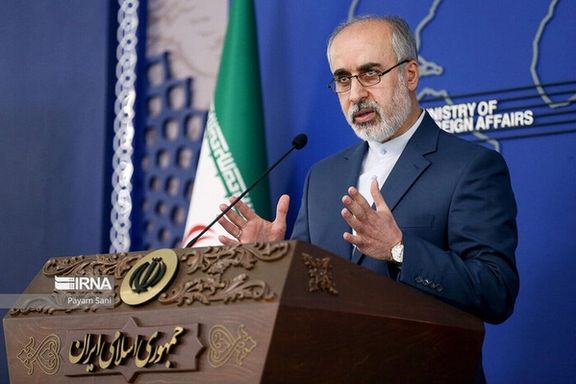
Iran’s foreign ministry says Tehran has seen positive steps in recent negotiations on Iran's nuclear issue, though claims they do not meet regime demands.

Iran’s foreign ministry says Tehran has seen positive steps in recent negotiations on Iran's nuclear issue, though claims they do not meet regime demands.
"We have seen [a] moving away from the non-constructive atmosphere and destructive politics in the opposite parties," Nasser Kanaani told a weekly presser on Monday.
Seemingly referring to covert talks with the US, which the US continues to deny, Kanaani also said however, that the talks are still "not enough", though did not elaborate further.
About two weeks ago, another round of negotiations was held between Ali Bagheri-Kani, Iran's Chief Nuclear Negotiator, and Enrique Mora, the Deputy Secretary General for Political Affairs and Director of the European External Action Service, in Doha.
One day after the meeting, CNN quoted an informed source as saying that the discussion appears to be “leading to positive developments on many issues.”
According to CNN, it seems a momentum is building to revive the talks over Iran's expanding nuclear program.
CNN also added that the meeting focused on key sticking points, including nuclear enrichment levels and Iranian cooperation with the International Atomic Energy Agency.
However, on Sunday, the Guardian wrote that the three European countries that signed the JCPOA plan to breach the JCPOA for the first time by refusing to lift sanctions against the Islamic Republic.
In recent days, the forced leave of the United States Special Representative for Iran Robert Malley, has fueled the uncertainties about the talks between the United States and Tehran.
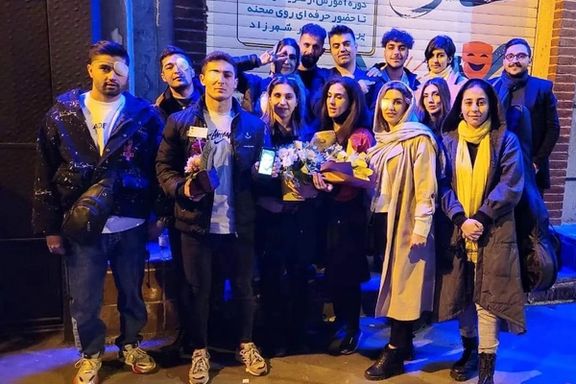
The spokesperson of the French Foreign Ministry reacted to criticism from her Iranian counterpart over the handling of protests, slamming Iran's record of killing and blinding protesters.
Referring to the protests which have erupted in France following the death in police hands of a young Muslim, Anne-Claire Legendre said: “We understand your concern for human rights and the lives of French citizens ... and for this reason, we will not kill anyone with a weapon of war, nor will we shoot an eye to blind it!”
Legendre's comments came after Spokesman for the Iranian Ministry of Foreign Affairs Nasser Kanaani “advised the French government and police to take into account the demands of the protesters while exercising restraint and avoiding violence,” the issue widely covered in Iranian state media.
Legendre was referring to the killing of hundreds of protesters by the Iranian regime in the months following the death in custody of Mahsa Amini in September. The Islamic Republic security forces have also been systematically targeting protesters’ eyes.
Norway-based Iran Human Rights on Friday documented over 20 cases of people being blinded in one eye as a result of fire from the security agents during protests, adding that initial data indicates that young women were disproportionately represented among people who had sustained such wounds.
The group claimed that Iran Human Rights researchers have collected and verified information related to many citizens who have lost their sight in one or both eyes as a result of being shot with shotguns or paintball guns in the nationwide protests in recent months. The report also provided a list of cases independently verified by their researchers, noting that the real number is much higher.
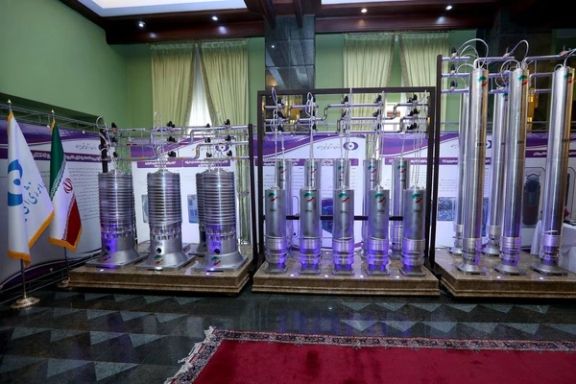
After the UN nuclear watchdog signaled its unhappiness with what it said was slow progress in its dealings with Iran, some in Tehran have questioned all cooperation.
Iranian lawmaker Ali Khezrian said Sunday that parts of a recent agreement with the International Atomic Energy Agency (IAEA) are contrary to the "strategic action" law ratified by the parliament in December 2020.
Khezrian is an influential lawmaker belonging to the hardline Paydari group dominating the Iranian parliament.
He was referring to the bill passed by the parliament, dominated by hardliners, in December 2020, dubbed the ‘Strategic Action To Eliminate Sanctions and Defend Iranian Nation's Interests.’
The bill authorized higher-level uranium enrichment to force the United States to lift economic sanctions imposed in 2018, when former President Donald Trump withdrew from the JCPOA nuclear agreement.
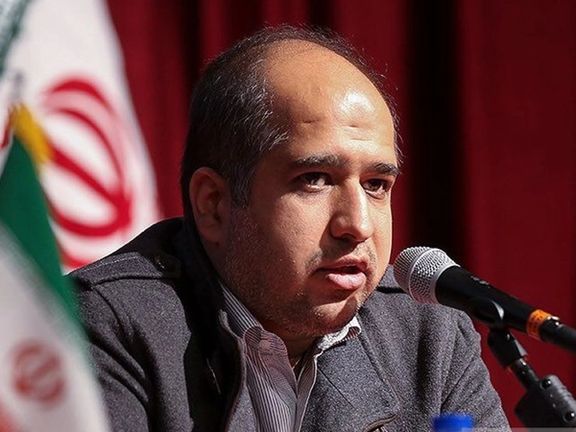
The bill also mandated restrictions on nuclear monitoring by the IAEA. Since the passage of the law, Iran has further restricted international monitoring and inspections, adding to the complicated dynamics of renewing the JCPOA.
The bill’s stipulation about higher levels of uranium enrichment was not an empty negotiating tactic. Iran actually began enrichment at 20 percent in early 2021, breaking the JCPOA limit of 3.65 percent. Subsequently, enrichment was increased to 60 percent during talks with West to revive the JCPOA. Tehran now has enough fissile material for at least two nuclear bombs, and it also gradually restricted IAEA monitoring access to its nuclear facilities, introducing another complicating factor into the JCPOA talks.
Khezrian, who is the spokesman of the parliament’s Article 90 Committee, made the remarks as he was talking about a recent meeting of the Committee and the head of the Atomic Energy Organization of Iran, Mohammad Eslami and his deputies.
The committee is supposed to deal with complaints against the President, Parliament or the Judiciary.
Khezrian said that after Eslami briefed the committee on the agreement reached with the IAEA in March, the lawmakers were unanimous that it violates the "strategic action" law as well as the orders of the Supreme Leader.
He said that re-installing IAEA monitoring systems at Esfahan (Isfahan) nuclear site was beyond the Safeguards Agreement and based on the additional protocol to the IAEA-Iran agreement, which cover basic requirements of cooperation with the IAEA under the NPT. He added that two EMDs (Environmental Monitoring Devices) were also installed at Natanz and Fordow nuclear sites to oversee the enrichment lines, calling them even beyond the JCPOA.
According to Khezrian, “the EMDs were installed without obtaining legal permits from the relevant authorities, which is not only against the law approved by the parliament, but also beyond the JCPOA obligations, because in the JCPOA, the OLEM (the On-Line Enrichment Monitor) device is mentioned for measuring the level of enrichment, so it should be clarified what are the differences between these two devices.”
Earlier in June, Iran said it reinstalled 10 cameras of the UN nuclear watchdog in one of its installations that were removed last year when the UN watchdog’s board of governors in June 2022 censured Tehran for its lack of cooperation with the agency.

Following his criticism, several lawmakers close to the administration of President Ebrahim Raisi – and members of parliament’s national security and foreign policy committee -- rejected Khezrian’s claims, emphasizing that the recent measures are in line with the law.
MP Shahriar Heidari said that the ‘strategic action law’ had been written and approved with the aim of canceling sanctions, adding, “If the other side accepts the lifting of sanctions, cooperation between Iran and the IAEA is bound to increase according to the clauses of the Law.”
Echoing similar views, lawmakers Fada-Hossein Maleki and Yaghoub Rezazadeh said that the measures adopted by the country’s nuclear agency are “completely in line with the law of strategic action.”
All these remarks were made a few days after IAEA Director General Rafael Grossi expressed concerns about Iran's nuclear program and the regime’s sluggish cooperation with the agency. "Iran's continuing enrichment activities, it's raising concerns,” he said.
The recent movements in the Iranian political landscape seem to be a reaction to reports that European diplomats have informed Tehran they plan to retain EU ballistic missile sanctions set to expire in October under the defunct 2015 Iran nuclear deal.
According to a report published by the Guardian on Sunday, the UK and other European powers are expected soon to announce plans to breach the 2015 Iran nuclear deal for the first time. The justification cited by EU and British diplomats included Iran’s own breach of the accord.
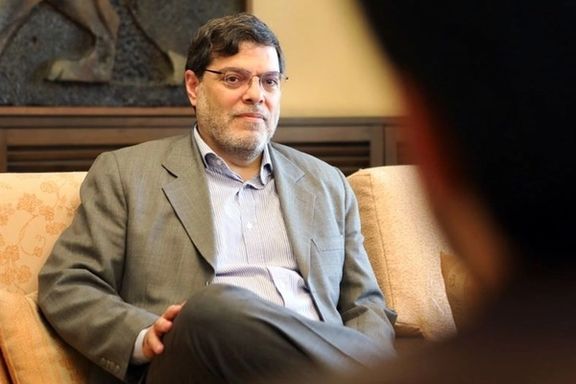
Mohammad Marandi, an advisor to the Iranian nuclear negotiating team was removed from his post as the international affairs deputy of the University of Tehran.
The political commentator, whose statements about the nuclear negotiations have received a lot of mixed reactions over time, was sacked upon reported differences with the dean.
Shargh daily Sunday quoted Marandi as saying that the reason for his dismissal was his objection to "the sale of degrees and Tehran University's loss of reputation".
Marandi was the dean of Tehran University's World Studies Center. However, academics in Tehran say the center no longer exists. That could explain Marandi's official title as "Former head of the university's World Studies Center."
Marandi was ridiculed by some Iranian commentators in recent months for having said last summer that "a hard winter in Europe" will force European powers to come back to the negotiating table. Marandi had predicted: "The winter is coming, and the EU will have to face a paralyzing energy crisis."
A few months later pundits in Iran scorched Marandi over his prediction while Iran itself faced energy shortage in winter.
Heshmatollah Falahatpisheh, an outspoken critic of the government in foreign policy, said predictions by Iranian officials that Europe would plunge into cold, and they would run back to nuclear negotiations with Iran have turned out to be "illusions."
Marandi was born in the US in 1966. He is the son of Alireza Marandi who is Supreme Leader Ali Khamenei's family doctor. When he first came to Iran after his father was appointed Health Minister, Mohammad was only 13.
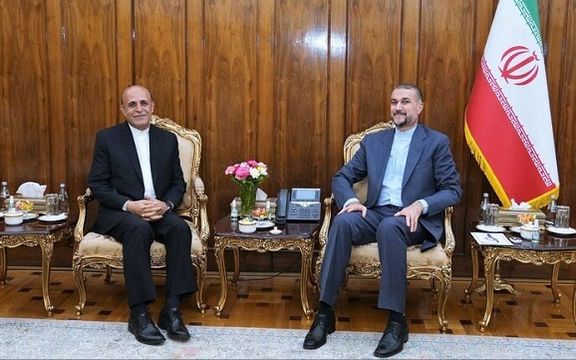
Iranian state media quoted an informed source as saying that the Islamic Republic currently has no plans to send a new ambassador to Sweden.
The state-run IRNA news agency reported Sunday that the decision was made after the burning of the Quran by a man in the European country.
This comes as local media earlier reported the administrative procedures for sending the new ambassador are completed. They also published a picture of the new ambassador Hojatollah Faghani and the Minister of Foreign Affairs, Hossein Amir-Abdollahian.
Faghani previously worked in the embassies of the Islamic Republic in Tbilisi and Brussels and was also the ambassador to Dushanbe, the capital of Tajikistan.
Two men publicly burned the Quran outside Stockholm's central mosque on Wednesday, an act approved by a Swedish court.
It was deliberately timed to coincide with the significant Muslim holiday, Eid al-Adha, further magnifying the incident's significance.
The act led to protest rallies in several Muslim countries, with Iraqis holding a large demonstration outside the Swedish embassy in Baghdad.
Iran’s foreign ministry also summoned Sweden’s charge d’affaires in Tehran.
Several Muslim nations as well as the European Union condemned the latest incident of desecration of the Quran on Saturday.
“Manifestations of racism, xenophobia and related intolerance have no place in Europe,” Nabila Massrali, the EU spokesperson for foreign affairs and security policy, expressed in a statement.
“The EU joins the Swedish Ministry of Foreign Affairs in its strong rejection of the burning of a [copy of the Holy] Quran by an individual in Sweden. This act in no way reflects the opinions of the European Union.”
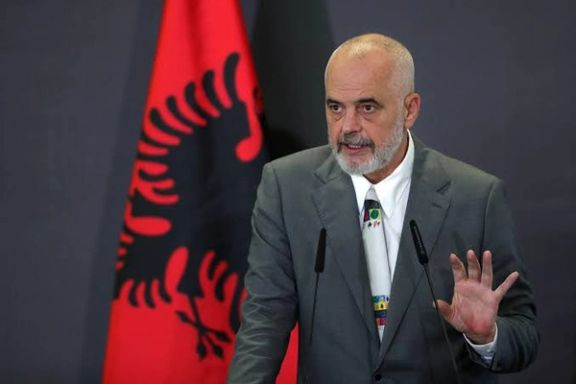
Edi Rama, Albania's prime minister, said in an interview with Der Spiegel on Friday that the Mujahideen cannot use Albania to fight the Iranian regime.
A few days ago, the Albanian State Police, on the orders of the Special Court, conducted checks in the Mojahedin-e-Khalq (MEK) camp, resulting in clashes between its residents and security forces.
The opposition group said on June 20 that hundreds of Albanian police officers raided the group's exile center, Camp Ashraf, in an unexpected move.
The group alleged one of their members, identified as Ali Mostashari, died and more than a hundred others were injured, with some hospitalized in critical condition after police raided the camp using tear gas and pepper spray and seizing computers. The group claimed the attack was instigated by the Iranian regime.
Albanian authorities denied any loss of life or injuries, saying that the incident happened due to the group’s refusal to cooperate with the police.
Police said it had suspicions that there may be people on the premises involved in cyberattacks against Tirana as well as criminal “acts of larger dimensions.”
Rama told Spiegel although the MEK are welcome, they should not use Albania as a political platform.
“Albania has no intention of being at war with the Iranian regime. Albania does not accept anyone who has abused our hospitality,” he added.
He also noted that Tirana accepted thousands of the MEK members under a life-saving operation at the request of the Obama administration in 2016.
“Our country is used as a trench in a war that is not ours, it does not work! Of course, they have every right to fight for their freedom, but to do so they must leave Albania,” the prime minister noted.